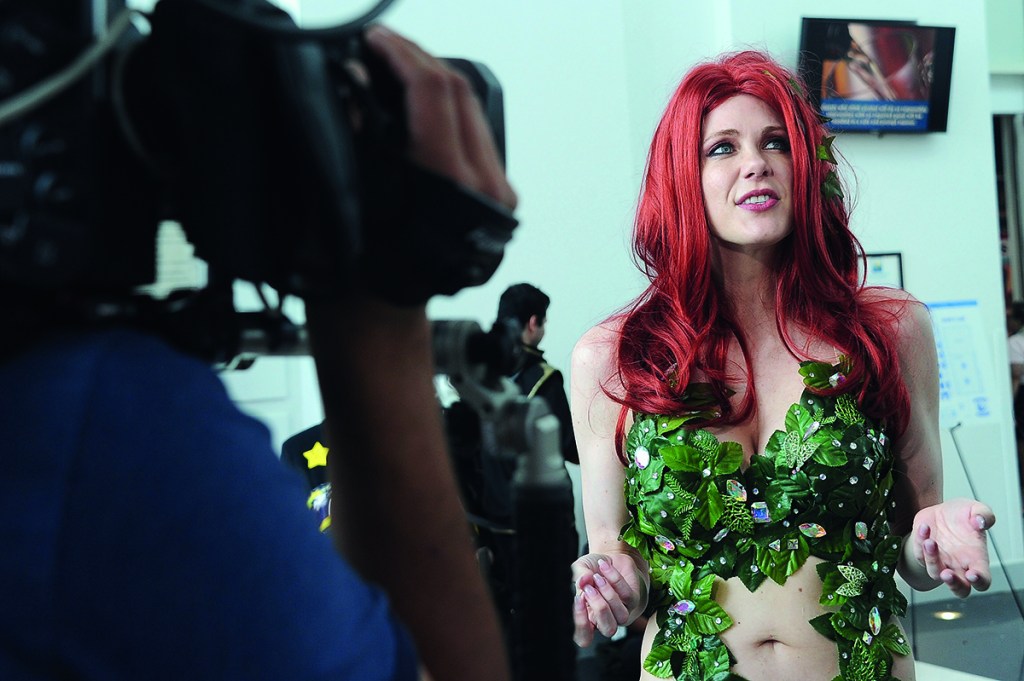The virtue of chastity is often confused with the state of virginity, or the practice of abstinence. For the Christian man or woman, chastity is more a frame of mind, an integrated approach to love and sex. While virginity or abstinence can result from chastity, they are themselves beside the point. Naturally, these distinctions are lost on the “sex-positive” movement, which tends to reject religious views of sex out of hand as repressive and weird.
In her memoir Rated X: How Porn Liberated Me from Hollywood, Maitland Ward tells the story of how she went from being a struggling, miserable actress to a successful, “happy” porn star. In Ward’s case, the struggling versus the successful seem to correlate strongly with the unhappy versus happy, yet she remains convinced that her change of heart is due to pornography being the fulfillment of her true self. Perhaps even divinely ordained. During her sexually active youth, Ward endured her religious grandmother’s views on sex as well as a picture of Jesus that hung on the bedroom wall. But after she became a porn star, the picture seemed less threatening. “His eyes weren’t following me now,” she writes: “And they seemed kinder somehow. Maybe they were never really judging me for anything. Maybe they just wanted me to take notice of things. And I think doing porn really did make Jesus proud.”
In the Gospel of John, after Jesus saved the woman caught in adultery from being stoned to death by a mob of angry hypocrites, the good Lord did not say, “Go now and live your best life,” but rather, “go now and leave your life of sin.” Central to Christianity is this same Jesus’ claim that “the truth”— not your truth — “will set you free.”
Nevertheless, Ward thinks her truth is better. She recalls how, when she was six years old, she asked her grandmother why her Barbie doll didn’t have a vagina. The old woman’s inartful reply was that “you don’t need those parts until you’re married.” But later, Ward “couldn’t think of any worse time to lose your virginity than your wedding night.” She recalls how her friend’s sister had taken a “purity vow,” stuck to it, then, after her honeymoon, broke down in tears because “there’s nothing special now that what you’ve been saving is spent.”
Presumably, the young woman in question loved her husband, would recover from her initial disappointment and emotional hang-ups, and, between them, they’d figure out how to have an enjoyable sex life. But Ward’s pessimistic conclusion is that the woman was really upset “because the dick wasn’t any good and now she was married to it.” Reducing people to their capacity to provide immediate gratification is a recurring theme throughout.
Ward’s sexual experiences aren’t exactly devoid of emotional difficulties. After having a threesome with two bisexual men she’d just met, she “cried for an hour and then sat there numb, trying to figure out why I was so upset.” She later concludes she was just upset because she “enjoyed it so much.” Later, when chatting with an escort, Ward asks whether the woman ever felt objectified by men. “I control men’s dicks,” the woman replies. “They should be the ones feeling objectified by me.” Ward is impressed and inspired by this display of “sexual power.”
When she was an actress, Ward realized that “to be expendable is to be a woman in Hollywood.” However, after making the transition into porn, she was thrilled how “people accepted and celebrated me for exactly, authentically who I was and were excited to discover along with me who I was becoming.” Is celebrating the porn star’s identity really top of mind for porn consumers? Might they be more concerned with getting off? This thought does not seem to have occurred to Ward, who is ecstatic with the realization of “true” dreams, such as posing as Princess Leia being penetrated by Darth Vader’s lightsaber on a Malibu beach.
Ward’s many graphic descriptions of her sexual encounters (not really my cup of tea) reveal that she hasn’t done or achieved much else. Sadly though, throughout her memoirs, Ward frequently confuses people responding to her “content” — whether tabloid interest, flattery or money — as proof of its cosmic significance. “Disney Princess and Boy Meets World Star Is Now Doing PORN!” one news headline ran. Ward recalls: “I beat Bernie Sanders’s heart attack on the day the news went viral. I was the number one Google search that day, with 3 million searches alone just for my name, while his near-death was number two.” Um, congrats?
Offline, the best way of discovering meaning and purpose in life is by loving the people around you — your spouse, for instance. Ward has that opportunity but conceives of it differently. After having multiple affairs with women, all of which her husband supported, Ward told him she’d like to have sex with other men. Her husband obliged. He’s not a “cuck,” she assures her reader. Indeed, Ward details how this conversation turned out to be a wonderful new height of intimacy in their marriage:
It was the most connected I had ever felt with a person in my whole life. I had never had anyone look me [sic] and recognize my twisted-up sexual desires as something valid and real and necessary and as something that had the possibility of being good. I never expected that my husband of all people would be the one to embrace the taboo nature of who I really was. But he had shown me before when he recognized my need to be with women, and he was showing me now again. And a good marriage is all about showing up.
According to the moral relativist’s logic, we are supposed to take her feelings as unquestionable reality (her truth) and congratulate her for being so honest and brave. But by objective standards, “showing up” in marriage clearly does not extend to green-lighting adultery, the very thing marital vows explicitly forbid. And grant me whatever I want and say I need is a superficial basis for love, to put it mildly.
Although Kelsy Burke is also a relativist, her book The Pornography Wars: The A Past, Present and Future is a more serious attempt to understand the so-called “competing truths” of sex positivism and its religious and feminist opponents. Burke, raised Methodist, became a born-again Christian and a Baptist at age fifteen, but was also “queer without yet having the label” and into porn. “Looking back at my life as a teenager, I can say that both Jesus and Playboy saved me,” she writes.
Readers interested in the history of the porn debate will appreciate Burke’s rigorous account of the circulation of smut during the Civil War, the anti-obscenity lobbying of US Postal Service inspector Anthony Comstock, the influence of FBI director J. Edgar Hoover, the battle at the Supreme Court from Roth v. United States (1957) to Miller v. California (1973) and beyond, the explosion of internet porn and the recent shift of anti-porn activism toward public health and anti-trafficking policies.
As a commentator, Burke is generous and conciliatory. “Despite the polarizing rhetoric, those fighting the porn wars have a lot in common, including the fact that they believe sexuality is of utmost importance in the world in which we live,” she writes. Indeed, one curious area of overlap in the Venn diagram of sex obsessives is that of the hypocrites and hedonists. For example, North Carolina Republican representative. Madison Cawthorn warned about “sexual perversion” and “orgies” in Washington, only to be embarrassed by leaked pictures of him wearing women’s lingerie on a cruise ship.
Admirably, Burke gives equal space to porn advocates and critics. “Some conservative religious women, like their activist feminist counterparts, insisted that they opposed pornography not because they were anti-sex, but because they wanted to reclaim women’s sexuality,” she writes. Nevertheless, it’s clear that she understands the feminist objection to porn better than the religious one. Viewing notions of sexual complementarity through the lens of “patriarchy,” Burke is uneasy with what she calls the “dominant ideology of conservative Protestantism, which presupposes that God created men and women distinct from one another in order to come together in marriage.”
The sex-positive movement, represented by Ward — and deemed worthy by Burke — celebrates promiscuity, “rough sex,” threesomes, public masturbation, adultery, pornography and whatever else a person consensually enjoys. Yet it’s not quite anything goes, since it also attacks virginity and abstinence, without even acknowledging the rationale for chastity. This tension is inevitable. Despite efforts to disguise it, the law of noncontradiction persists. And the “truce” Burke kindly suggests is impossible.

























